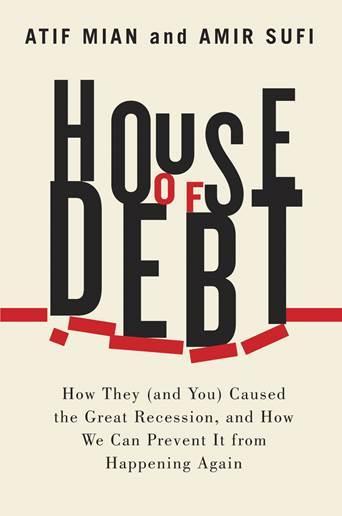
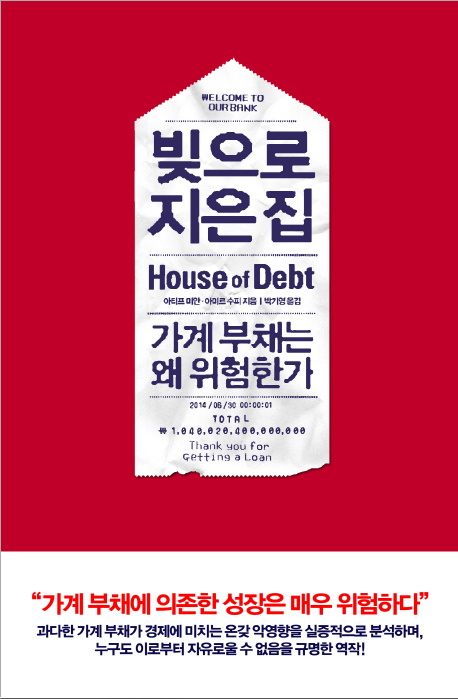
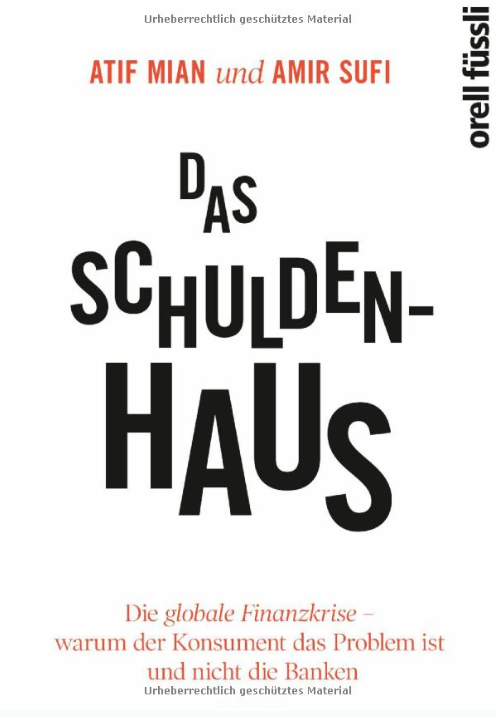
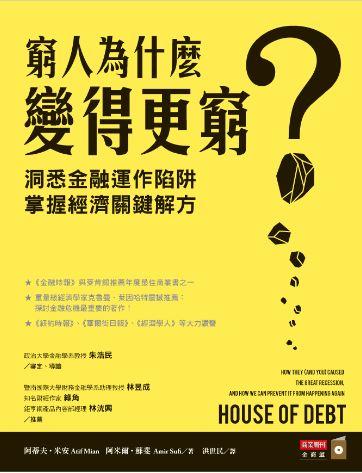
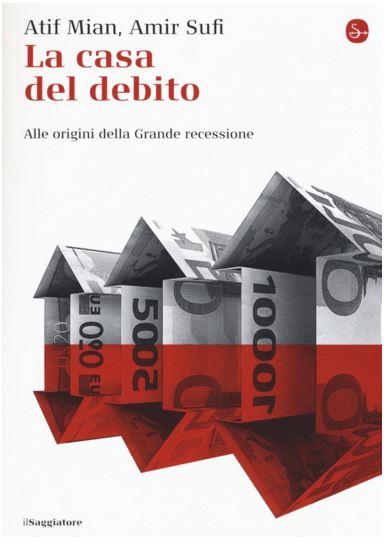
|
FT/McKinsey Business Book Of The Year 2014 - Shortlisted
"It is all too easy to get wrapped up in the glamour and squalor of financial maneuvers. One forgets that the financial system is useful only to the extent that it makes the everyday economy of production, employment, consumption and capital formation work better, and avoids doing harm. Mian and Sufi do not make this mistake. Their principles and their very ingenious research keep the focus where it belongs. They tell a powerful story about excessive debt that any reader can understand, they nail it down with careful use of data, and they have serious ideas about how to make the system better and safer. It is a splendid book.” - Robert M. Solow, Nobel Laureate, Institute Professor, Professor of Economics at MIT
"likely to be the most important economics book of 2014 ... the most important book to come out of the 2008 financial crisis ... in many ways a model for what economists should do" "the leading experts on this subject are the economists Atif Mian and Amir Sufi" "The jewel of 2014 is House of Debt by Atif Mian and Amir Sufi ... this work will take its place in the canon of literary economic breakthroughs"
"a concise and powerful account of how the great recession happened and what should be done to avoid another one" - The Economist “magnificent book" "brilliant new book" "a profoundly important book" "compelling evidence" "illuminating insight into the dangers of collateralized finance" |
BOOK REVIEWS AND MEDIA COVERAGE
The Case Against the Bernanke-Obama Financial Rescue, Binyamin Appelbaum, The New York Times (print), 05/16/2014
“Mian and Sufi are convinced that the Great Recession could have been just another ordinary, lowercase recession if the federal government had acted more aggressively to help homeowners by reducing mortgage debts. ... They are particularly critical of Timothy Geithner, the former Treasury secretary, and Ben Bernanke, the former Federal Reserve chairman, for focusing on preserving the financial system without addressing ... [the] more important problem of excessive household debt.”
Larry Summers on `House of Debt', Financial Times (print), 06/06/2014
"House of Debt, despite some tough competition, looks likely to be the most important economics book of 2014. ... it could be the most important book to come out of the 2008 financial crisis and subsequent Great Recession. ... in many ways a model for what economists should do"
Book Review: 'House of Debt' by Atif Mian and Amir Sufi, The Wall Street Journal (print), 05/28/2014
"a concise and powerful account of how the great recession happened and what should be done to avoid another one"
Springtime for Bankers, Paul Krugman, The New York Times (print), 05/18/2014
"the leading experts on this subject are the economists Atif Mian and Amir Sufi"
No one (important) wants faster growth, The Economist, 05/13/2014
"House of Debt", distills lessons about the crisis from their recent research into one easily digestible package"
Europe faces the horrors of its own House of Debt, Wofgang Munchau, Financial Times, 06/15/2014.
"In their magnificent book House of Debt, Atif Mian and Amir Sufi find that what is outwardly disguised as a credit crunch is in reality a fall in demand for loans."
IMF "Generation Next", Finance and Development, September 2014.
"25 economists under 45 who are shaping the way we think about the global economy"
The Politico50 list of thinkers, doers and dreamers, Politico Magazine, September 2014.
"For rewriting the narrative of the Great Recession"
The Agenda, Reihan Salam, National Review, 04/22/2014
“In House of Debt, their brilliant new book . . . Mian and Sufi detail the ways in which the housing bust damaged the economic well-being low- and middle-income households across the country.”
Books of the Year, 2014, "The jewel of 2014 is House of Debt by Atif Mian and Amir Sufi ... this work will take its place in the canon of literary economic breakthroughs" - The Independent
Best Books Of '14, [one of] "the most-cited selections ... by CEOs, investors, current and former policy makers, economists and academics" - Bloomberg
The Opposite of Insurance, The Economist (print), 05/17/2014
The Unwinnable War, The Economist, 05/16/2014
Book Review by Heather Boushey, The Atlantic, 05/21/2014
Video Interview with Mian and Sufi on the "House of Debt", and a Review, Financial Times, 05/28/2014
Debt, Recession and Words of Advice: Interview with Atif Mian, The Leonard Lopate Show (audio), 06/04/2014
Mian and Sufi focus on household debt relief, Bloomberg Radio (audio), 05/27/2014
The Shared-Responsibility Mortgage Could Help Bubbleproof the Housing Market, BusinessWeek, 05/22/2014
Rethinking the Great Recession, MSNBC, 05/29/2014
Book Review: House Of Debt By Atif Mian And Amir Sufi, Seeking Alpha, 06/02/2014
Washington Center for Equitable Growth, Introduction to House of Debt followed by Q/A (video), 05/29/2014
The Biggest Policy Mistake of the Great Recession, by David Dayen, The Fiscal Times, 06/06/2014
The Great Credit Mistake, Adair Turner, Project Syndicate, 06/06/2014
Bucherkiste (10): Weg mit den Schulden!, Frankfurter Allgemeine (German), 06/10/2014
Kreditklemme trotz EZB-Programmen: So viel Geld - und alles fur die Katz, Wolfgang Munchau, Spiegel online (German), 06/09/2014
בחובות שלנו יש קסם מיוחד, interview with Calcalist on House of Debt (Hebrew), 06/13/2014
The Great Recession's "biggest policy mistake", Mark Thoma, CBS News, 05/29/2014
How Housing Debt and Student Loan Debt Create a Double Drag on the Economy, Whet Moser, Chiago , 06/12/2014
What really happened to the best plan to help overly-indebted homeowners?, Matthew Yglesias, Vox , 06/13/2014
Summers: Helping Homeowners Would Have Hurt Banks, David Dayen, 06/06/2014
Geithner, Mian and Sufi on the crisis, Robert Hockett, The Hill, 05/28/2014
Best of 2014, Lists, FiveThirtyEight
Back Cover Endorsements:
“Much has been written about the boom and subsequent bust that rocked the US economy during 2007–2009, but insightful and informed analysis is much rarer. This book is one of those rare gems. It offers an in-depth look at the state of housing, consumer credit, household incomes, and debt around the crisis and presents an informed discussion about its causes and consequences. The analysis of crisis resolution has resonance, not only for the United States, but for the many countries that are still entangled in severe financial difficulties.”
(Carmen Reinhart, Harvard University)
“House of Debt is a very important book, reaching beyond surface explanations of the Great Recession to identify the fundamental cause—excessive private debt built up in the pre-crisis boom years. It combines meticulous empirical research with an ability to see the big picture. Its message needs to be heeded and its proposals for reform seriously considered if we are to avoid repeating in future the mistakes of the past.”
(Lord Adair Turner, former chair, Financial Services Authority)
“Mian and Sufi have produced some of the most important and compelling research on the impact of debt on consumer behavior during the recent housing bubble and bust. This excellent new book presents and expands this research in a rigorous, yet engaging and accessible way.”
(Christina D. Romer, former chair of the Council of Economic Advisers and UC Berkeley)
“This is a profoundly important book that makes a huge range of serious empirical evidence on the financial crisis accessible to a broad readership. A compendium of Mian and Sufi’s own celebrated work would already be a spectacular contribution, but this book is so much more. Although the authors present all views in a balanced, scholarly way, their quiet insistence that we should have moved faster to write down household mortgages is well-reasoned and compelling.”
(Kenneth Rogoff, Harvard University)
SENATE TESTIMONY
Senate Testimony on "Consumer Protection and Middle Class Wealth Building in an Age of Growing Household Debt", before the financial institutions and consumer protection subcommittee, 10/04/2011
[Summary Remarks], [Full Testimony]
Senate Testimony On "State of the American Dream: Economy Policy and the Future of the Middle Class", before the committee on banking, housing and urban affairs, 06/06/2013
[Summary Remarks], [Full Testimony]
OP-EDS / COMMENTARY
Student borrowers assume too much risk (with Amir Sufi), The Washington Post, 05/29/2014
Why Tim Geithner is wrong on homeowner debt relief (with Amir Sufi), The Washington Post, Wonkblog, 05/14/2014
Why the Housing Bubble Tanked the Economy And the Tech Bubble Didn't (with Amir Sufi), Five Thirty Eight, 05/12/2014
How Debt-Ridden Housing Holds Back U.S. Recovery (with Amir Sufi), Bloomberg View, 02/29/2012
How Household Debt Contributes to Unemployment (with Amir Sufi), Bloomberg View, 11/16/2011
Household debt and macroeconomic fluctuations (with Amir Sufi), VoxEU, 04/29/2010
Housing bubble fueled consumer spending (with Amir Sufi), The Wall Street Journal (Real Time Economics), 06/25/2009
SELECT MEDIA COVERAGE OF RESEARCH BEHIND THE HOUSE OF DEBT
Chain of Fools, The Economist (print), 02/07/2008
Origins of the current mortgage problems, The NBER Digest, April/May 2008
Congressional votes tied to voter default, The Wall Street Journal, 11/07/2008
What's in it for me?, The Slate, 11/06/2008
Lessons From The Fall: Household Debt Got Us Into This Mess, NPR Planet Money, 09/10/2009
Withdrawal Symptoms, The Economist (print), 09/03/2009
House Prices, Home Equity-based borrowing, and the U.S. Household leverage crisis, The NBER Digest, November 2009
Household Debt Can Hasten Recovery, When It Goes Unpaid, Wall Street Journal, 10/27/2009
Vote no to the American dream, The Economist, 06/22/2010
Study: Subprime Lending Fueled by Campaign Cash, The Wall Street Journal, 06/22/2010
The great debt drag, The Economist (print), 09/16/2010
Stimulus for clunkers, The Wall Street Journal, 09/21/2010
Cash for clunkers was a wash, NPR Planet Money, 09/03/2010
Congressional support for subprime lending, The NBER Digest, November 2010
America's broke recovery, The Economist, 01/20/2011
Cash for clunkers had modest and short-lived effects, The NBER Digest, February 2011
Foreclosures, hosue prices and the real economy, The NBER Digest, June 2011

